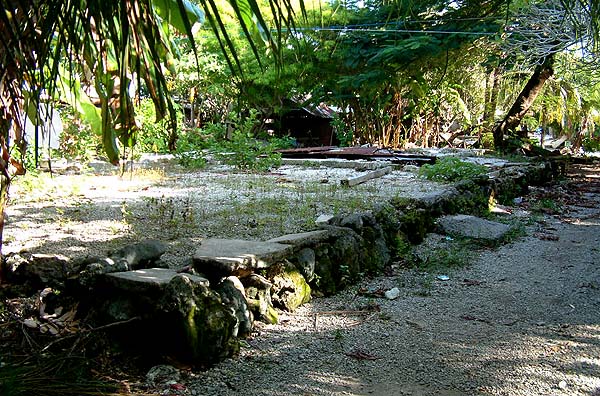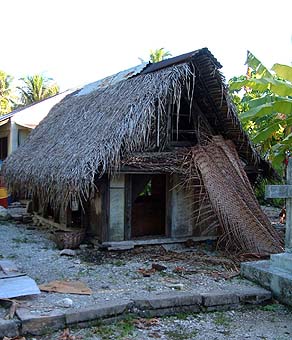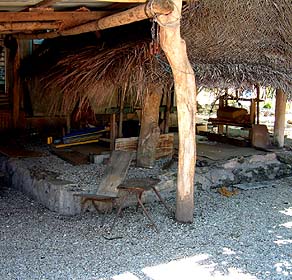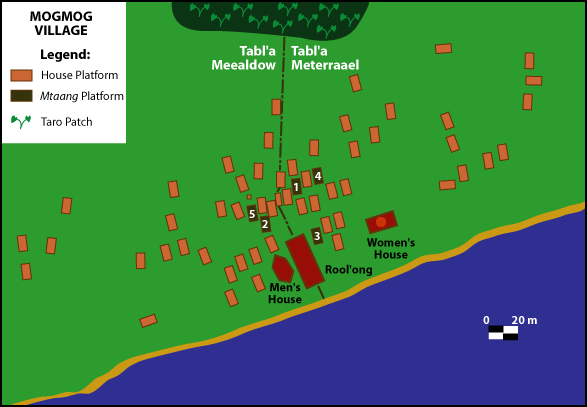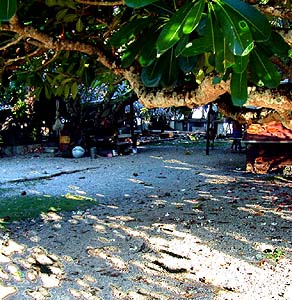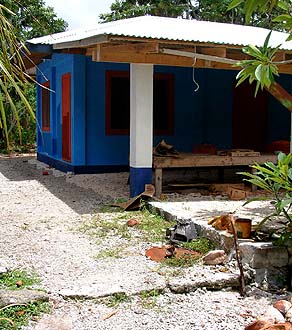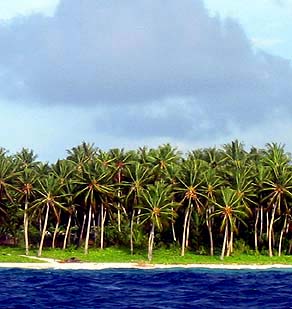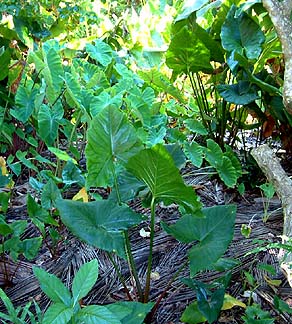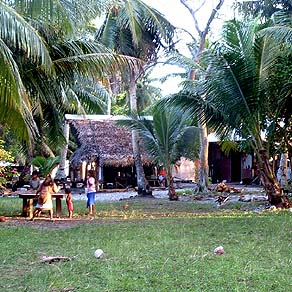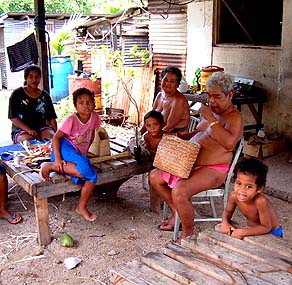 |
 |
 |
|||||
|
|
|
|
|
|
|
|
|
|
|
|||||||
|
|
|
|
The platform, or daeyif, for Legfaeliuy-igap, the number-five mtaang.
|
|
“I cannot really tell you a definition of the word mtaang,” Stanley reflects, “because that’s an old term. But the function and responsibilities of the five mtaang are like police. They carry out orders, and are the right hand of the chief or the king. So the king assigns us to be responsible for certain things: to take care of the laws and the rules, regulations, to look up to the people and make sure the law is upheld."
|
||
|
|
||
“The title mtaang comes with this platform. People from a long time ago , they set the rocks, and built these platforms. The King assigned the responsibility and gave them names. That’s when they became mtaang, or otherwise we would all be just ordinary residents of Mogmog. But because of the responsibility of this title, these people become something. "Anybody else who holds this title in the future, they will live here. If you live somewhere else, you may belong here but the problem is that you cannot talk for here, because you are living elsewhere. The title and the place go together. You cannot get this title and go home to Asor. I cannot go to Asor and talk for Legfaeliuy mtaang, or they will say, ‘Hey, who are you?’"
|
|
|
“Mtaang platforms, we call them daeyif,” Philip affirms. “When we talk about mtaang, we are talking about their daeyif, because our authority comes from the platform. And each platform has responsibilities and some rights. On Mogmog we have five mtaang on this side. My family is the highest. Chief Taithau, he’s my brother. So he is from that mtaang. He’s the oldest among us so he is active. Faaelmey is the name of that clan from where he is, and they are the overall supervisor of all the mtaang in Mogmog. "Chief Taithau’s platform, that’s first mtaang: Faaelmey," Stanley elaborates. "And the second, next to that in size, is Legfaeliuy-imat. That’s me, here. And the third, where there was a house usually, is Hadiyaar. The fourth is Fall'ol, and the fifth is Legfaeliuy-igap. And that’s the last one. So five. And Chief Taithau’s is the first."
|
| |
|
Map of Mogmog village, after Descantes (1998).
|
“These mtaang have separate rights and responsibilities," Philip explains. "For example on Mogmog, Faaelmey is the highest mtaang, and it supervises or overlooks the whole activities of the island. Also it keeps peace among the people. If two clans are fighting over the boundary of their lands, and they seem not to be able to solve their problems, these mtaang will step in between them and say ‘I will define your land for you.’ "And whatever the division of the lands made by these high chiefs, you will have to follow it, because if you don’t follow it you will be cut off from your own land. Because our system here is that nobody owns land; you live on your land only during the time that you behave."
|
||
|
|
||
“If you misbehave, the chiefs will punish you. And if you continue misbehaving, they will, we say, ‘give you your paddle,’ which means they will kill you. But they won’t do it by a hand – they will let you paddle away and if you know how to navigate, you might find a sand bar some place, but if you don’t know then you will die in the ocean. But that’s what ‘giving him his paddle’ means. We don’t do it unless it’s a very, very, severe offense.” "We punish people based on the situation," Stanley adds. "We don’t go for favoritism. We go for what we’re supposed to do, whether your brother, your father or whatever. So, if you disturb peace, we’re responsible to give you punishment. As policemen, we look after and enforce the law. "So some of us have to be awake at night, and go around continually, we just don’t go and sleep. If there are two or three of us, ‘O.K., so you go that end and you stick around this area, I go that end,’ we watch what is going on in the entire village."
|
|
|
"And we also watch the shore for incoming people, in the middle of the night. Anything that comes in to the island, we have to know. In case people arrive, we don’t always know who is supposed to come, and who is not, and why people come and why this particular person comes to Mogmog. We should know and then we’ll give the right instruction. "If the man comes here to see a girlfriend , and if I happen to see the arrival of the man, I should know what to do. We cannot just go in and beat somebody right away because he entered the village territory in the wrong time. We just have to warn, we give them right instruction, ‘please return.’ "Because if another policeman happens to come and we’re here together and I’m not doing anything, we will be in trouble. And as people go around on the island, we watch after them."
|
|
|
|
"We also watch the food situation—the fruits, the bananas and even the taro on the island—to make sure that we continue having supplies. You do not use your own garden or farm, because it’s not really yours. You plant those, but it’s under the chief. "Similarly we also oversee the fishing seasons: we determine what type of fish are supposed to be in season, then that kind of fishing is done. When the chiefs say, ‘will have some good fish this month’ he has already heard from us, ‘Oh, we’ve been checking and we already have enough.’ We have to have report daily, weekly or monthly, then the chief will understand, ‘okay, now I will be expecting this type of fish because it’s the right time for fishing for this kind of fish'."
|
||
|
|
||
“The chiefs have the right to tell you what to do on your land and what not to do," Phillip states. For example, even if a coconut tree is yours and it has good coconuts on it, you can not pick your coconuts because the chief will be angry. You will just keep them for an emergency. And there are times when it happens, then the chief will say, ‘O.K. you pick your coconuts.’ "So the mtaang execute the custom, they enforce the custom. If the men go fishing and they come back with plenty of fish, it is their responsibility to distribute the fish among the people to make sure that everyone gets something, gets their fair share of the catch."
|
|
|
“The same is true about the ladies of the island: they also have leaders from these clans that I named before, and they supervise the activities in the taro patch and the gardens. They know how much taro there is in each person’s taro patches—they go and check. "If you take one from your taro patch, the lady will get mad, and they really get mad at you if you do that, because only on special occasions that the women chiefs will say, ‘O.K. – we will harvest the taro for everybody on the island.’ But you can not just go and take your taro. So everybody is controlled by the chiefs.”
|
|
|
|
“The mtaang has more land than the rest of the clans on the island," Stanley says. "It belongs to us because of the service that we do to the chief and to the higher ranked people, they give us bigger land properties, and whenever the chief needs something, we’re the ones that would lead to doing most, or to provide the most from the lands that was given to us by the chiefs. “The other clans that are not the mtaang clans, those are hafaaeraeg. Hafaarag are the helpers, and there are nine on each side of the division of Mogmog, nine east, nine west. Some hafaaeraeg even belong to the mtaang platform, to the mtaang clan. But these two terms specify the responsibility and the level of people holding each place. "Hafaaeraeg are not separate clans. The names are sort of, for example, cigarette and lighters: they have to associate in order to have a smoke. So without hafaarag we may not function. We have to have hafaaeraeg because they are holding other properties and some time we may run out when we distribute things. And then that’s when they step in."
|
||
|
|
||
“We have equal positions to mtaang on the other islands,” Mariano says. “They take the responsibilities as the mtaang do here on Mogmog. Over on Fedraey they call them tooalfaer, instead of mtaang. Tooalfaer in Fedraey do the same responsibility as mtaang on Mogmog. Different names on each island. “I am a member of the family that sort of maintains order under the Chief of Asor. It is much like a mtaang. We don’t use the term mtaang. Maybe that term was used in the past, way in the past. But I can recall when I was young, when referring to member of the clan, we just say, ‘the enforcer clans,’ or something like that. Faaelharfad is the term. Faaelharfad means 'under the apple tree,' so probably their platform was under an apple tree. Nowadays we do not have that apple tree anymore. That clan's job involves moving from place to place checking out things, seeing if they are in the right order.”
|
|
|
“The Falalop community has ten clans,” Chief Yatch adds. “Ten clans and two clans for chiefs. The clan that I am standing on, my clan, is chief of the whole island. The other chief is for the people. And the other eight are controlling reefs, agriculture, and ‘police,’ something like that. "Two clans each control these things. Two for the reefs and fishing. Two clans taking care of agriculture, taro patch and all those things. And the other two are policing the island, watching over the island. They take orders from us, the higher chiefs—the chiefs of the people and of the land. Sometimes we get together, discuss what can be done on the island."
|
|
|
|
| "I really do not belong to the high clan," Stanley says, "but I am on estate of Legfaeliuy which one of the mtaang, so where I live brings me up to this position of mtaang. But I was adopted. The person to follow me should be a descendent of the original family, but they no longer exist, none of them are around. All the responsibilities and authorities have ended up on me, because I am the only one left behind. And so I should do the job of mtaang. "My adoptive mother told me, ‘when we adopt you, we choose you. The date of your birth, it wasn’t only you born, but several kids. But why not go get one of the other kids? But we chose to pick you, so that you will come here.’ And that’s a matter of some inspiration in their minds to choose me. To have your own child, it can happen any time, you may not plan to have a boy or have a girl, you can accidentally have one. So they told me: ‘you stay when we die, and don’t worry about it, just do the function. Make sure you function well, you do exactly what we told you, because if you don’t, you see, you fail your part.’"
|
||
|
|
||
|
|
|
|
|
|

|
| Ulithi Home | Map Library | Site Map | Pacific Worlds Home |
|
|
|
|

|
|
|
||
|
Copyright 2003 Pacific Worlds & Associates • Usage Policy • Webmaster |
